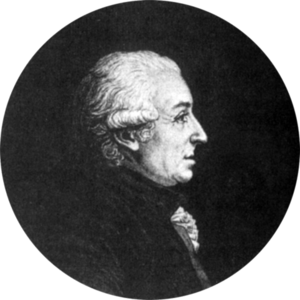Mathurin Jacques Brisson facts for kids
Quick facts for kids
Mathurin Jacques Brisson
|
|
|---|---|
 |
|
| Born | 30 April 1723 |
| Died | 23 June 1806 (aged 83) Croissy-sur-Seine, France
|
| Known for | Ornithologie |
| Awards | Academy of Sciences |
| Scientific career | |
| Fields | Zoology, ornithology, entomology |
| Institutions | College of Navarre, Paris |
| Author abbrev. (botany) | Briss. |
| Author abbrev. (zoology) | Brisson |
Mathurin Jacques Brisson (French pronunciation: [matyʁɛ̃ ʒak bʁisɔ̃]; 30 April 1723 – 23 June 1806) was a French zoologist and natural philosopher.
Brisson was born on 30 April 1723 at Fontenay-le-Comte in the Vendée department of western France. His parents wished him to take ecclesiastic orders, but in 1747, he abandoned his studies, and from 1749, was employed by the wealthy French naturalist René Antoine Ferchault de Réaumur as the curator of a large private collection of objects related to natural history that de Réaumur kept at his ancestral home at Réaumur in the Vendée.
Brisson became interested in the classification of animals and was influenced by the works of Carl Linnaeus and Jacob Theodor Klein. His book Le Règne animal was published in 1756, and the highly regarded six-volume work Ornithologie was published in 1760.
The English ornithologist Alfred Newton wrote of Brisson's Ornithologie that it was "a work of very great merit so far as it goes, for as a descriptive ornithologist the author stands even now unsurpassed; ...". For each species Brisson clearly indicated whether he had examined a specimen or whether he was relying on descriptions by other authors. Although in Brisson coined a Latin name for each bird species, these do not conform to the binomial system and are not recognised by the International Commission on Zoological Nomenclature (ICZN). However, Brisson also introduced names for genera and these are accepted by the ICZN. Linnaeus relied heavily on Brisson's work when updating his Systema Naturae for the twelfth edition in 1766. Linnaeus added 386 bird species of which 240 were based exclusively on Brisson.
De Réaumur died in 1757 and although in his will he left his large collection to the French Academy of Sciences, it was instead absorbed into the "Cabinet du roi", the royal natural history collection in Paris. Brisson abandoned zoology and in 1762 succeeded Jean-Antoine Nollet as professor of physics at the College of Navarre in Paris.
For a period of time, Brisson was an instructor of physical sciences and natural history to the family of the monarch. From 1759, he was a member of the Academy of Sciences.
A significant work involving the "specific weight of bodies" was his Pesanteur Spécifique des Corps published in 1787. In his investigations of electricity, Brisson was opposed to the theories of Priestley and Franklin.
He married Marie-Denise Foliot de Foucherolles on 24 April 1775. They had three children. He died on 23 June 1806 at Magny-les-Hameaux near Versailles
See also
 In Spanish: Mathurin Jacques Brisson para niños
In Spanish: Mathurin Jacques Brisson para niños

